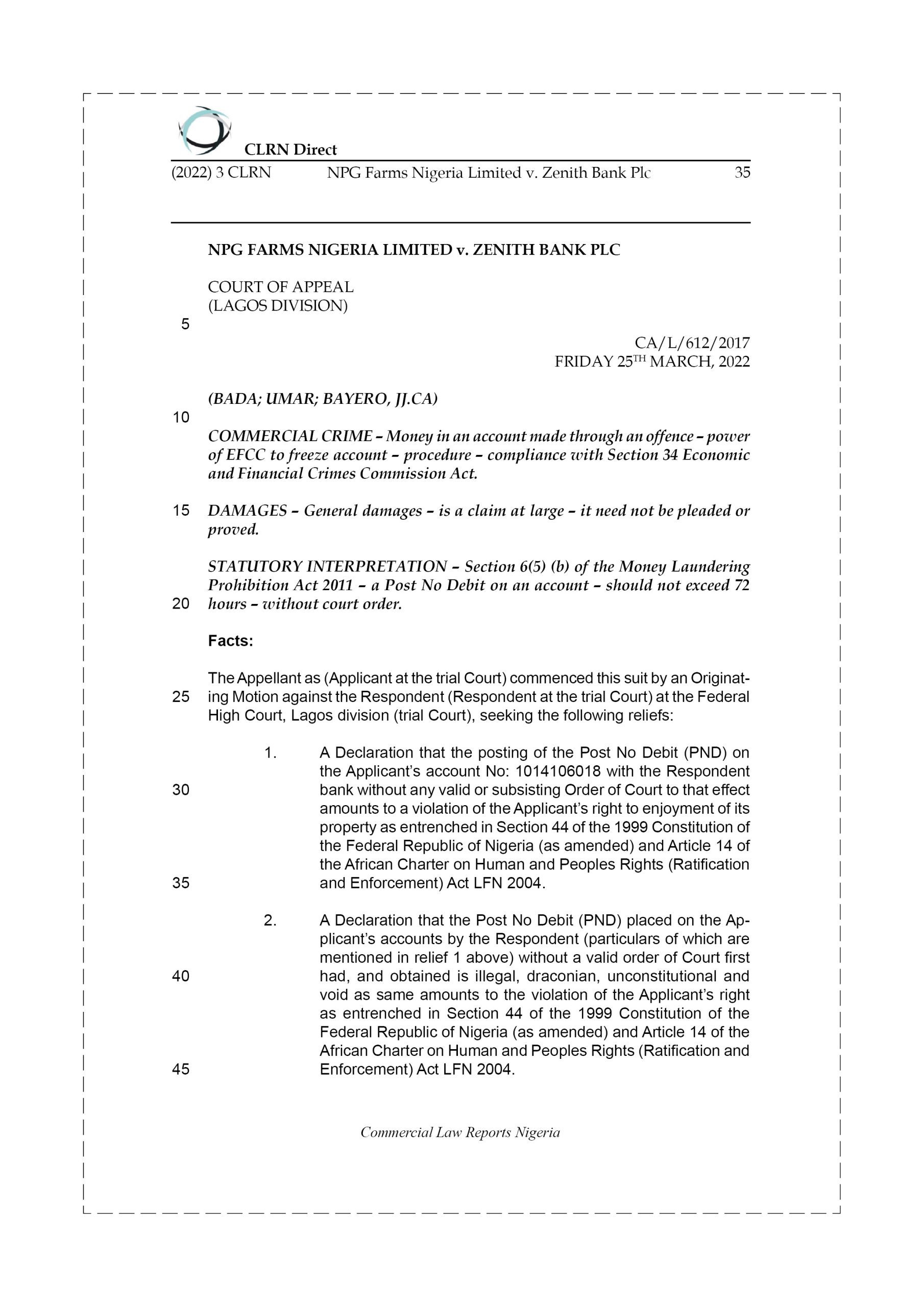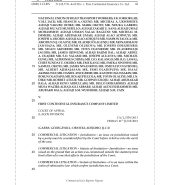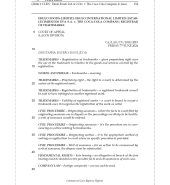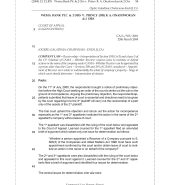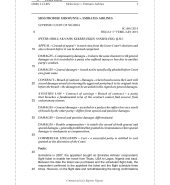-

Leadway Assurance Co. Ltd v. Zeco Nigeria Ltd
- kg
1 × ₦1,000
-

Godwin Iweha v. Ebice Company Limited
- kg
1 × ₦1,000
NPG FARMS NIGERIA LIMITED v. ZENITH BANK PLC
₦1,000
In Stock
Facts:
The Appellant as (Applicant at the trial Court) commenced this suit by an Originating Motion against the Respondent (Respondent at the trial Court) at the Federal High Court, Lagos division (trial Court), seeking the following reliefs:
1. A Declaration that the posting of the Post No Debit (PND) on the Applicant’s account No: 1014106018 with the Respondent bank without any valid or subsisting Order of Court to that effect amounts to a violation of the Applicant’s right to enjoyment of its property as entrenched in Section 44 of the 1999 Constitution of the Federal Republic of Nigeria (as amended) and Article 14 of the African Charter on Human and Peoples Rights (Ratification and Enforcement) Act LFN 2004.
2. A Declaration that the Post No Debit (PND) placed on the Applicant’s accounts by the Respondent (particulars of which are mentioned in relief 1 above) without a valid order of Court first had, and obtained is illegal, draconian, unconstitutional and void as same amounts to the violation of the Applicant’s right as entrenched in Section 44 of the 1999 Constitution of the Federal Republic of Nigeria (as amended) and Article 14 of the African Charter on Human and Peoples Rights (Ratification and Enforcement) Act LFN 2004.
3. A Declaration that the Post No Debit (PND) placed on the Applicant’s account in the custody of the Respondent (particulars of which are mentioned in relief 1 above) has resulted in tremendous loss of profit, damage to business image and integrity and has seriously affected the Applicant’s dealings with its business partners.
4. An Order of this Honourable Court directing that the Post No Debit (PND) placed on the Applicant’s account with the Respondent (particulars of which are mentioned in relief 1 above) be lifted forthwith thereby giving the Applicant unhindered access to funds in its account with the Respondent.
5. An Order of perpetual Injunction restraining the Respondent, their agent, assigns, privies or anyone howsoever described from interfering and/or denying the Applicant the unfettered right to operate its accounts with the Respondent.
6. General damages of the sum of N100,000,000.00 Naira only (One Hundred Million Naira only.)
The Appellant who maintains a current account with the Respondent bank at their Ibadan branch during the months of April, May, and June 2016, attempted to perform transactions on its account and was informed that the management of the Respondent had placed a Post No Debit (PND) on the said account since February 2016. The Appellant further attempted to effect a transfer from its account sometime around 12th August, 2016 and was informed by the teller helping to process the transfer that the account could not be processed. The Appellant alleged that the Respondent acted arbitrarily without getting an order of court in freezing its account, nor did it notify it of its action to Post No Debit on its account, and this as result, has frustrated the operation and maintenance of the Appellant’s business.
The Respondent on the other hand through its Counter Affidavit contended that its action of Post No Debit on the Appellant’s account was in compliance with the instruction from the Economic and Financial Crimes Commission (EFCC), via a letter, wherein the EFFC instructed it to place the Appellant’s account in the Post No Debit category. The Respondent further stated that it acted on the statutory power of the EFCC, and since was not given a time limit for which the restriction was to be placed on the Applicant’s accounts, it continued to place the restriction. The Respondent however stated that having received a letter from the Appellant’s Counsel of its intention to institute an action for the enforcement of fundamental human rights, it reached out to EFFC, who instructed it to lift the restrictions on the Appellant’s account which it had since complied with.
At the conclusion of the hearing before the trial Court, a considered Judgment was delivered, in which the application of the Appellant was dismissed.
The Appellant being dissatisfied with the Judgment of the trial Court appealed to the Court of Appeal.
